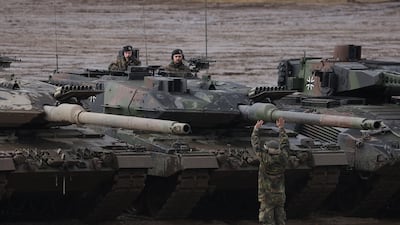Before a high-stakes meeting on weapons for Ukraine in Germany on Friday, 11 Nato countries pledged new military aid to support the country's war against Russia.
"The West must stay united and continue to support Ukraine with military aid," Estonian Defence Minister Hanno Pevkur said in his home country, alongside Britain's Ben Wallace and other officials.
"What Ukraine needs most is heavy weaponry … the hardest battles are still ahead," Mr Pevkur said.
Gathering at a military base, the officials pledged missiles, Stinger air defence systems, anti-aircraft guns, machineguns, training, and other equipment and services.
Britain, which has already announced plans to send tanks to Ukraine, will also send 600 Brimstone missiles, Mr Wallace said.
Hours after the meeting, the Danish government said it would donate 19 French-made Caesar field guns to Ukraine, fulfilling the wish of Ukrainian President Volodymyr Zelenskyy but stunting its own military build-up.
The US on Thursday threw its weight behind Ukraine’s demand for German battle tanks.
Lloyd Austin, the US Defence Secretary, was in Germany to urge Defence Minister Boris Pistorius to release the Leopard tanks that could help Ukraine to regain land from Russia.
Berlin's approval is needed before countries such as Poland and Finland, which have German-made Leopards in their arsenals, can export them to Ukraine. Germany could also donate some of its own.
German Chancellor Olaf Scholz has long sat on the fence regarding the tanks but the clamour has grown since allies such as France and Britain broke new ground by sending fighting vehicles.
A decision could be made on Friday at a summit hosted by Mr Austin at a US airbase in Germany.
The Pentagon said the Leopards were the ideal next step for Ukraine because of their advanced equipment and ability to fire on the move over rough terrain.
Mr Austin’s aim is to “unlock that decision” for Germany to send the tanks, said a senior US defence official.
“We've already been working with Ukrainians on T-72 and other Soviet-era tanks. What's facing them is the next step,” the official said.
“That's why we're looking at modern, mechanised armoured capabilities. And that's why the focus on tanks, and Germany, is the key to that capability.”
Reports suggest Mr Scholz, who has long said Germany will act only in concert with allies, is looking for political cover from Washington, such as a shipment of American M1 Abrams tanks.

Mr Zelenskyy criticised that stance in remarks to the World Economic Forum in Davos.
“When someone says 'I will give tanks if someone else will also share tanks' … I don't think this is the right strategy to go with,” he said.
Defence experts said the Abrams were unsuitable for Ukraine and that Germany would hardly be acting unilaterally by sending the Leopards, because allies were in favour and sending their own tanks.
“It makes little military sense for the US to deliver Abrams for political reasons so that the Leopards can go,” said Marcus Faber, a defence expert and MP in Mr Scholz’s coalition.
Britain has already announced it will send heavy battle tanks, with a squadron of Challenger 2s destined for Ukraine in the coming weeks. The UK said it was urging allies to be quick with military aid.
But Mr Pistorius, who was sworn in to the German defence post on Thursday, said the US was Germany’s most important ally.
“The basis on which Nato stands … is guided by common values, a common strategy, common actions and common responsibility,” he said before his meeting with Mr Austin.
“What I can say is that, together with our partners, we will support Ukraine in its fight for freedom and territorial sovereignty.”
Ukraine conflict - in pictures
Mr Pistorius took over the Defence Ministry from the much-maligned Christine Lambrecht, who resigned on Monday after heavy criticism of her handling of the Ukraine crisis and problems with German equipment.
Overseeing the handover on Thursday, German President Frank-Walter Steinmeier said the war had forced the country into an era of military conflict “we believed was over”.
“This change of epochs has changed Europe, changed German politics and has also changed the tasks of the Defence Ministry,” Mr Steinmeier said.
Mr Austin praised Germany for its support for Ukraine so far, which has included howitzers, rocket launchers and air defence missiles, after Berlin abolished a policy of not sending weapons to conflict zones.
He said allies at Friday’s summit would “renew our united commitment to support Ukraine’s self-defence for the long haul”.
But the tanks issue has come to a head after Poland and others signalled they were ready to donate their Leopards if Germany lifted its veto.
Senior German officials have stood by their stance that while nothing is ruled out, they will not act unilaterally or risk entering a wider conflict with Russia, a particularly sensitive subject in Germany because of the brutal Nazi-Soviet war.
Mr Scholz's critics say he has damaged Germany's standing as a Nato ally after a series of similar delays since war in Ukraine broke out last February.















